- Home
- Victor Hugo
Les Misérables Page 9
Les Misérables Read online
Page 9
CHAPTER II--M. MYRIEL BECOMES M. WELCOME
The episcopal palace of D---- adjoins the hospital.
The episcopal palace was a huge and beautiful house, built of stone atthe beginning of the last century by M. Henri Puget, Doctor of Theologyof the Faculty of Paris, Abbé of Simore, who had been Bishop of D---- in1712. This palace was a genuine seignorial residence. Everything aboutit had a grand air,--the apartments of the Bishop, the drawing-rooms,the chambers, the principal courtyard, which was very large, with walksencircling it under arcades in the old Florentine fashion, and gardensplanted with magnificent trees. In the dining-room, a long and superbgallery which was situated on the ground-floor and opened on thegardens, M. Henri Puget had entertained in state, on July 29, 1714, MyLords Charles Brûlart de Genlis, archbishop; Prince d'Embrun; Antoinede Mesgrigny, the capuchin, Bishop of Grasse; Philippe de Vendôme, GrandPrior of France, Abbé of Saint Honoré de Lérins; François de Berton deCrillon, bishop, Baron de Vence; César de Sabran de Forcalquier, bishop,Seignor of Glandève; and Jean Soanen, Priest of the Oratory, preacher inordinary to the king, bishop, Seignor of Senez. The portraits of theseseven reverend personages decorated this apartment; and this memorabledate, the 29th of July, 1714, was there engraved in letters of gold on atable of white marble.
The hospital was a low and narrow building of a single story, with asmall garden.
Three days after his arrival, the Bishop visited the hospital. The visitended, he had the director requested to be so good as to come to hishouse.
"Monsieur the director of the hospital," said he to him, "how many sickpeople have you at the present moment?"
"Twenty-six, Monseigneur."
"That was the number which I counted," said the Bishop.
"The beds," pursued the director, "are very much crowded against eachother."
"That is what I observed."
"The halls are nothing but rooms, and it is with difficulty that the aircan be changed in them."
"So it seems to me."
"And then, when there is a ray of sun, the garden is very small for theconvalescents."
"That was what I said to myself."
"In case of epidemics,--we have had the typhus fever this year; wehad the sweating sickness two years ago, and a hundred patients attimes,--we know not what to do."
"That is the thought which occurred to me."
"What would you have, Monseigneur?" said the director. "One must resignone's self."
This conversation took place in the gallery dining-room on theground-floor.
The Bishop remained silent for a moment; then he turned abruptly to thedirector of the hospital.
"Monsieur," said he, "how many beds do you think this hall alone wouldhold?"
"Monseigneur's dining-room?" exclaimed the stupefied director.
The Bishop cast a glance round the apartment, and seemed to be takingmeasures and calculations with his eyes.
"It would hold full twenty beds," said he, as though speaking tohimself. Then, raising his voice:--
"Hold, Monsieur the director of the hospital, I will tell you something.There is evidently a mistake here. There are thirty-six of you, in fiveor six small rooms. There are three of us here, and we have room forsixty. There is some mistake, I tell you; you have my house, and I haveyours. Give me back my house; you are at home here."
On the following day the thirty-six patients were installed in theBishop's palace, and the Bishop was settled in the hospital.
M. Myriel had no property, his family having been ruined by theRevolution. His sister was in receipt of a yearly income of five hundredfrancs, which sufficed for her personal wants at the vicarage. M. Myrielreceived from the State, in his quality of bishop, a salary of fifteenthousand francs. On the very day when he took up his abode in thehospital, M. Myriel settled on the disposition of this sum once forall, in the following manner. We transcribe here a note made by his ownhand:--
NOTE ON THE REGULATION OF MY HOUSEHOLD EXPENSES.
For the little seminary . . . . . . . . . . . . . . 1,500 livres Society of the mission . . . . . . . . . . . . . . 100 " For the Lazarists of Montdidier . . . . . . . . . . 100 " Seminary for foreign missions in Paris . . . . . . 200 " Congregation of the Holy Spirit . . . . . . . . . . 150 " Religious establishments of the Holy Land . . . . . 100 " Charitable maternity societies . . . . . . . . . . 300 " Extra, for that of Arles . . . . . . . . . . . . . 50 " Work for the amelioration of prisons . . . . . . . 400 " Work for the relief and delivery of prisoners . . . 500 " To liberate fathers of families incarcerated for debt 1,000 " Addition to the salary of the poor teachers of the diocese . . . . . . . . . . . . . . . . . . . 2,000 " Public granary of the Hautes-Alpes . . . . . . . . 100 " Congregation of the ladies of D----, of Manosque, and of Sisteron, for the gratuitous instruction of poor girls . . . . . . . . . . . . . . . . . . . . 1,500 " For the poor . . . . . . . . . . . . . . . . . . . 6,000 " My personal expenses . . . . . . . . . . . . . . . 1,000 " ------ Total . . . . . . . . . . . . . . . . . . . . 15,000 "
M. Myriel made no change in this arrangement during the entire periodthat he occupied the see of D---- As has been seen, he called it_regulating his household expenses_.
This arrangement was accepted with absolute submission by MademoiselleBaptistine. This holy woman regarded Monseigneur of D---- as at one andthe same time her brother and her bishop, her friend according to theflesh and her superior according to the Church. She simply loved andvenerated him. When he spoke, she bowed; when he acted, she yielded heradherence. Their only servant, Madame Magloire, grumbled a little. Itwill be observed that Monsieur the Bishop had reserved for himselfonly one thousand livres, which, added to the pension of MademoiselleBaptistine, made fifteen hundred francs a year. On these fifteen hundredfrancs these two old women and the old man subsisted.
And when a village curate came to D----, the Bishop still found means toentertain him, thanks to the severe economy of Madame Magloire, and tothe intelligent administration of Mademoiselle Baptistine.
One day, after he had been in D---- about three months, the Bishopsaid:--
"And still I am quite cramped with it all!"
"I should think so!" exclaimed Madame Magloire. "Monseigneur has noteven claimed the allowance which the department owes him for the expenseof his carriage in town, and for his journeys about the diocese. It wascustomary for bishops in former days."
"Hold!" cried the Bishop, "you are quite right, Madame Magloire."
And he made his demand.
Some time afterwards the General Council took this demand underconsideration, and voted him an annual sum of three thousand francs,under this heading: _Allowance to M. the Bishop for expenses ofcarriage, expenses of posting, and expenses of pastoral visits._
This provoked a great outcry among the local burgesses; and a senatorof the Empire, a former member of the Council of the Five Hundredwhich favored the 18 Brumaire, and who was provided with a magnificentsenatorial office in the vicinity of the town of D----, wrote to M.Bigot de Préameneu, the minister of public worship, a very angry andconfidential note on the subject, from which we extract these authenticlines:--
"Expenses of carriage? What can be done with it in a town of less thanfour thousand inhabitants? Expenses of journeys? What is the useof these trips, in the first place? Next, how can the posting beaccomplished in these mountainous parts? There are no roads. No onetravels otherwise than on horseback. Even the bridge between Durance andChâteau-Arnoux can barely support ox-teams. These priests are all thus,greedy and avaricious. This man played the good priest when hefirst came. Now he does like the rest; he must have a carriage and aposting-chaise, he must have luxuries, like the bishops of the oldendays. Oh, all this priesthood! Things will not go well, M. le Comte,until the Emperor has freed us from these black-capped rascals. Downwith t
he Pope! [Matters were getting embroiled with Rome.] For my part,I am for Cæsar alone." Etc., etc.
On the other hand, this affair afforded great delight to MadameMagloire. "Good," said she to Mademoiselle Baptistine; "Monseigneurbegan with other people, but he has had to wind up with himself, afterall. He has regulated all his charities. Now here are three thousandfrancs for us! At last!"
That same evening the Bishop wrote out and handed to his sister amemorandum conceived in the following terms:--
EXPENSES OF CARRIAGE AND CIRCUIT.
For furnishing meat soup to the patients in the hospital. 1,500 livres For the maternity charitable society of Aix . . . . . . . 250 " For the maternity charitable society of Draguignan . . . 250 " For foundlings . . . . . . . . . . . . . . . . . . . . . 500 " For orphans . . . . . . . . . . . . . . . . . . . . . . 500 " ----- Total . . . . . . . . . . . . . . . . . . . . . . . 3,000 "
Such was M. Myriel's budget.
As for the chance episcopal perquisites, the fees for marriage bans,dispensations, private baptisms, sermons, benedictions, of churches orchapels, marriages, etc., the Bishop levied them on the wealthy with allthe more asperity, since he bestowed them on the needy.
After a time, offerings of money flowed in. Those who had and those wholacked knocked at M. Myriel's door,--the latter in search of the almswhich the former came to deposit. In less than a year the Bishop hadbecome the treasurer of all benevolence and the cashier of all thosein distress. Considerable sums of money passed through his hands, butnothing could induce him to make any change whatever in his mode oflife, or add anything superfluous to his bare necessities.
Far from it. As there is always more wretchedness below than thereis brotherhood above, all was given away, so to speak, before it wasreceived. It was like water on dry soil; no matter how much money hereceived, he never had any. Then he stripped himself.
The usage being that bishops shall announce their baptismal names at thehead of their charges and their pastoral letters, the poor people of thecountry-side had selected, with a sort of affectionate instinct, amongthe names and prenomens of their bishop, that which had a meaning forthem; and they never called him anything except Monseigneur Bienvenu[Welcome]. We will follow their example, and will also call him thuswhen we have occasion to name him. Moreover, this appellation pleasedhim.
"I like that name," said he. "Bienvenu makes up for the Monseigneur."
We do not claim that the portrait herewith presented is probable; weconfine ourselves to stating that it resembles the original.

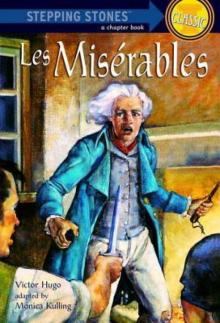 Les Miserables
Les Miserables The Hunchback of Notre-Dame
The Hunchback of Notre-Dame The Man Who Laughs
The Man Who Laughs The Last Day of a Condemned Man
The Last Day of a Condemned Man The Toilers of the Sea
The Toilers of the Sea Waterloo
Waterloo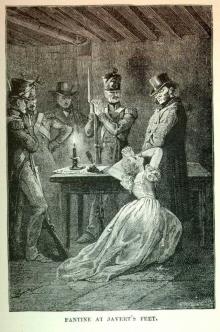 Les Misérables, v. 1/5: Fantine
Les Misérables, v. 1/5: Fantine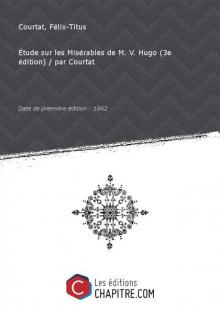 Les Misérables, v. 3/5: Marius
Les Misérables, v. 3/5: Marius Les Misérables, v. 2/5: Cosette
Les Misérables, v. 2/5: Cosette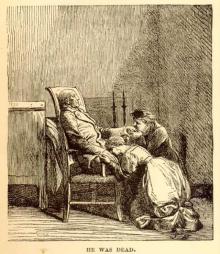 Les Misérables, v. 5/5: Jean Valjean
Les Misérables, v. 5/5: Jean Valjean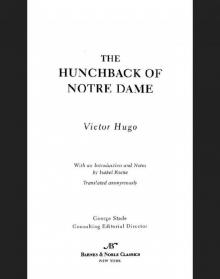 Hunchback of Notre Dame (Barnes & Noble Classics Series)
Hunchback of Notre Dame (Barnes & Noble Classics Series)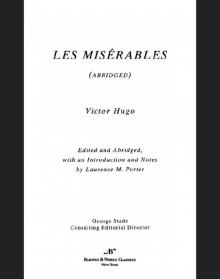 Les Miserables (abridged) (Barnes & Noble Classics Series)
Les Miserables (abridged) (Barnes & Noble Classics Series)